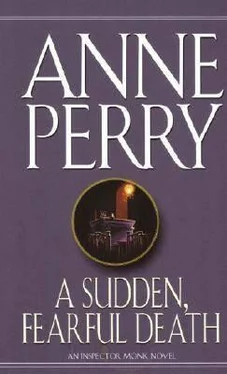Still he hated him for what he had suggested of Prudence, generally because he had seen the faces of the jury nodding, frowning, beginning to see her differently: less of a disciple of the lady with the lamp, tending the sick and desperate in dangerous foreign lands, and more as a fallible young woman whose dreams overcame her good sense.
But more particularly, and at the root of his anger, was the fact that it had woken the first stirrings of doubt in himself. The picture of her he had painted in his mind was now already just so very slightly tarnished, and try as he might, he could not clear it to the power and simplicity it had had before. It did not matter whether she had loved Sir Herbert Stanhope or not, was she deluded enough to have misread him so entirely? And worse than that, had she really performed the medical feats she had claimed? Was she really one of those sad but so understandable creatures who paint on the gray world the colors of their dreams and then escape into parallel worlds of their own making, warping everything to fit?
He could understand that with a sudden sickening clarity. How much of himself did he see only through the twisted view of his own lack of memory? Was his ignorance of his past his own way of escaping what he could not bear? How much did he really want to remember?
To begin with he had searched with a passion. Then as he had learned more, and found so much that was harsh, ungenerous, and self-seeking, he had pursued it less and less. The whole incident of Hermione had been painful and humiliating. And he suspected also that much of Runcorn's bitterness lay at his door. The man was weak, that was his one flaw, but Monk had traded on it over the years. A better man might not have used it in that way. No wonder Runcorn savored his final triumph.
And even as he thought it, Monk understood enough of himself to know he would not let it rest. Half of him hoped Sir Herbert was not guilty and he could undercut Runcorn yet again.
In the morning he went back to the hospital and questioned the nurses and dressers once more about seeing a strange young man in the corridors the morning of Prudence's death. There was no doubt it had been Geoffrey Taunton. He had admitted as much himself. But perhaps someone had seen him later than he had said. Maybe someone had overheard an angry exchange, angry enough to end in violence. Perhaps someone had even seen Nanette Cuthbertson, or a woman they had not recognized who could have been her. She certainly had motive enough.
It took Mm the best part of the day. His temper was short and he could hear the rough edges to his voice, the menace and the sarcasm in his questions, even as he disliked them. But his rage against Rathbone, his impatience to find a thread, something to pursue, overrode his judgment and his better intentions.
By four o'clock all he had learned was that Geoffrey Taunton had been there, precisely as he already knew, and that he had been seen leaving in a red-faced and somewhat flustered state while Prudence was still very much alive. Whether he had then doubled back and found her again, to resume the quarrel, was unresolved. Certainly it was possible, but nothing suggested that it was so. In fact, nothing suggested he was of a nature or personality given to violence at all. Prudence's treatment of him would try the patience of almost any man.
About Nanette Cuthbertson he learned nothing conclusive at all. If she had worn a plain dress, such as nurses or domestics wear, she could have passed in and out again with no one giving her a second glance.
By late afternoon he had exhausted every avenue, and was disgusted with the case and with his own conduct of it. He had thoroughly frightened or offended at least a dozen people, and furthered his own interests hardly at all.
He left the hospital and went outside into the rapidly cooling streets amid the clatter and hiss of carriages, the sound of vendors' cries as costers' carts traveled by, peddlers called their wares, and men and women hurried to reach their destinations before the heavy skies opened up in a summer thunderstorm.
He stopped and bought a newspaper from a boy who was shouting: "Latest on trial o' Sir 'Erbert! Read all about it! Only a penny! Read the news 'ere!" But when Monk opened the page it was little enough: merely more questions and doubts about Prudence, which infuriated him.
There was one more place he could try. Nanette Cuthbertson had stayed overnight with friends only a tew hundred yards away. It was possible they might know something, however trivial.
He was received very coolly by the butler; indeed, had he been able to refuse entirely without appearing to deny justice, Monk gathered he would have done so. The master of the house, one Roger Waldemar, was brief to the point of rudeness. His wife, however, was decidedly more civil, and Monk caught a gleam of admiration in her glance.
"My daughter and Miss Cuthbertson have been friends for many years." She looked at Monk with a smile in her eyes although her face was grave.
They were alone in her sitting room, all rose and gray, opening onto a tiny walled garden, private, ideal for contemplation-or dalliance. Monk quashed his speculations as to what might have taken place there and returned his attention to his task.
"Indeed, you might say they had been from childhood," Mrs. Waldemar was saying. "But Miss Cuthbertson was with us at the ball all evening. Quite lovely she looked, and so full of spirits. She had a real fire in her eyes, if you know what I mean, Mr. Monk? Some women have a certain"-she shrugged suggestively-"vividness to them that others have not, regardless of circumstance."
Monk looked at her with an answering smile. "Of course I know, Mrs. Waldemar. It is something a man does not overlook, or forget." He allowed his glance to rest on her a fraction longer than necessary. He liked the taste of power, and one day he would push his own to find its limits, to know exactly how much he could do. He was certain it was far more than this very mild, implied flirtation.
She lowered her eyes, her fingers picking at the fabric of the sofa on which she sat. "And I believe she went out for a walk very early," she said clearly. "She was not at breakfast. However, I would not wish you to read anything unfortunate into that. I am sure she simply took a little exercise, perhaps to clear her head. I daresay she wished to think." She looked up at him through her lashes. "I should have in her position. And one must be alone and uninterrupted for such a thing."
"In her position?" Monk inquired, regarding her steadily.
She looked grave. She had very fine eyes, but she was not the type of woman that appealed to him. She was too willing, too obviously unsatisfied.
"I-I am not sure if this is discreet; it can hardly be relevant____________________"
"If it is not relevant, ma'am, I shall immediately forget it," he promised, leaning an inch or two closer to her. "I can keep my own counsel."
"I am sure," she said slowly. "Well-for some time poor Nanette has been most fond of Geoffrey Taunton, whom you must know. And he has had eyes only for that unfortunate girl Prudence Barrymore. Well, lately young Martin Hereford, a most pleasing and totally acceptable young man…" She invested the words with a peculiar emphasis, conveying her boredom with everything so tediously expected. "… has paid considerable attention to Nanette," she concluded. "The night of the ball he made his admiration quite apparent. Such a nice young man. Far more suitable really than Geoffrey Taunton."
"Indeed?" Monk said with exactly the right mixture of skepticism, to entice her to explain, and encouragement, so she would not feel slighted. He kept his eyes on hers.
"Well…" She lifted one shoulder, her eyes bright. "Geoffrey Taunton can be very charming, and of course he has excellent means and a fine reputation. But there is more to consider than that."
Читать дальше












